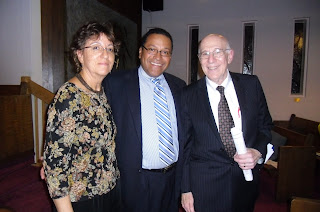 |
Rick Popovic of enhancedCare MD
and Ilene Corina |
(Wantagh NY, September 2011) Ilene Corina, President PULSE of NY and Patient Safety Advocate held a Family Centered Patient Advocacy training at enhancedCareMD in Rochester NY on August 30; just in time for the start of the much anticipated program servicing the people of Rochester and surrounding areas. EnhancedCareMD will offer better patient / provider relationships through phone calls, e-mails and more timely appointments.
The nurses and community patient’s advocate who would be called upon through this elite service, were taught about patient safety and areas where hospitals may fall short of safe care. Falls, infections, health literacy, medication and surgery safety were just some of the topics addressed. Difficult role playing scenarios often stumped participants and encouraged discussion about the importance of communication as well as past experiences and concerns.
Rick Popovic, Executive Vice President of enhancedCareMD played the part of an aggressive doctor speaking only to the advocate and rushing her to sign a consent form. The gentle nurse of 32 years, who played the advocate, struggled with the words to stand up to the doctor. She has always been taught to do and accept whatever the doctor says. One nurse in the room, also with over 30-years experience, suggested that nurses were taught for years to stand when a doctor enters the room. Participants practiced with an intensity that is sure to make them both thorough and sensitive to the patient’s needs.
Although there are different levels of care at enhancedCareMD, patient advocacy services are growing. An extra set of eyes can help ensure the patient’s safety. This training aligns with the mission of PULSE of NY: to educate and advocate for safe, quality care. Nurses in the patient advocate role are encouraged to be an extension of the patient. In the PULSE of NY training they are advised to avoid using their nursing skills because doing so can easily lead to overstepping their bounds as advocates. “The nurse advocate has the knowledge to recognize when more care or further explanation is needed but should not take the place of the patient / provider conversation” explains Ilene Corina who has been teaching Family Centered Patient Advocacy since 2006. “The nurse as an advocate shouldn’t be that different than a person with no medical background advocating”.








 Through such discussion with the community, PULSE of NY fulfills its mission of engaging and educating the public and communities with the goal of progressing towards safer patient care experiences as patients interface with the health system.
Through such discussion with the community, PULSE of NY fulfills its mission of engaging and educating the public and communities with the goal of progressing towards safer patient care experiences as patients interface with the health system. 